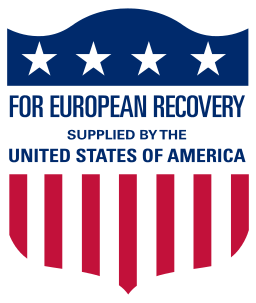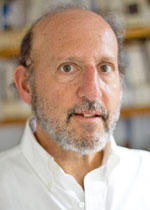The U.S. Should Lead a New Marshall Plan of Conservation and Alternative Energy for Eastern Europe
Ed. Note: EarthDesk is pleased to welcome first-time guest contributor Charles Komanoff, a lifelong, pioneering advocate on energy economics and transportation alternatives who makes his home here in New York. This post appeared on the Carbon Tax Center site on March 13. More on Charles at the conclusion.
Ev’rybody’s talkin’ ’bout Revolution, Evolution, Masturbation, Flagellation, Regulation, Integrations, Mediations, United Nations, Congratulations. — John Lennon, “Give Peace a Chance”

This logo, used on aid delivered to European countries during the Marshall Plan,
became necessary when the Soviet Union took credit for the poorly-marked U.S. foreign aid donations to European countries.
The number-one energy meme of late is “fracking changes everything,” with fracked oil and methane (gas) having turned the United States almost overnight into the world’s leading extractor of hydrocarbons and, perhaps soon, even a net exporter. And that was before Russia annexed the Crimea and muscled in on the rest of Ukraine. Now the chorus of voices calling on Congress and the White House to neutralize Vladmir Putin’s use of natural gas as a geopolitical weapon by making America the “arsenal of energy” for Eastern Europe, as a former Bush NSC official urged in the New York Times, has moved into the higher decibels.
In the past week, the Times’ editorial board and the director of the Geopolitics of Energy Project at Harvard University’s Kennedy School have been among those urging stepped-up U.S. oil and gas exports (and, hence, more fracking). And that’s just on the center-lib part of the spectrum. Kentucky Senator Rand Paul is demanding approval of the Keystone XL Pipeline, and pretty much the entire U.S. Right wants our oil-and-gas spigot on full bore as well.
To paraphrase John Lennon, everybody’s talking about gas fracking, well drilling, hydrocarbing, tar sands spilling (well, not spilling). But no one, it seems, is talking about exporting a different brand of energy to gas-dependent Eastern Europe: energy efficiency and renewables. Yet therm for therm, both would be just as effective as U.S. hydrocarbons at reducing the need for Russian gas. And, it almost goes without saying, efficiency and renewable could be in place a lot faster — and in a fashion that could allow Ukrainians, Czechs, Hungarians and Poles to be active participants in their liberation.
OK, dream on — this is the US of A, exporting mostly soybeans, coal and drones
The question arises: Why can’t the U.S. propose and take the lead in a new Marshall Plan — this one targeting Eastern Europe — that would: weatherize millions of homes; install combined heat-and-power systems in tens of thousands of schools, churches, and commercial buildings; replace every last electricity-guzzling incandescent bulb between the Elbe and the Dnieper with LED’s; and do likewise with refrigerators and other major home appliances? And, with only slightly longer lead times, build the bulb and appliance factories, train the engineers and installers, and groom the finance guys to put the pieces together? While of course retrofitting a million or more roofs with photovoltaics and erecting tens of thousands of industrial-size wind turbines? Who knows how big the gas savings (and CO2 reductions) would run, but they’re bound to be enormous.
OK, dream on — this is the US of A, locked into an “all of the above” energy policy and exporting mostly soybeans, coal and drones. But then, why not Germany to lead the way? After all, Chancellor Angela Merkel is visibly repelled by Russia’s incursion into Crimea; Financial Times reported her charge that Russia is pursuing “law of the jungle” policies. Yet Germany is doing at home precisely what Eastern Europe needs: implementing a society-wide energy transition, or energiewende, to steadily supplant fossil and nuclear power with wind, sunlight, biomass and efficiency.
Of all the world’s nations, Germany is by far the best situated — geographically, financially, technologically, and by virtue of its historical debt — to lead its Eastern European neighbors to sustainable independence from both East and West.
“You could say I’m a dreamer,” John sang, “but I’m not the only one.” Helping Eastern Europe transition from big-power supplicant to model for true energy progress could help many dreams come true.
«« »»
 Charles Komanoff is director of the consulting firm Komanoff Energy Associates, ‘re-founder’ and president emeritus of the renowned advocacy group Transportation Alternatives, a founding trustee of the Tri-State Transportation Campaign, co-ordinator of the pedestrian-rights organization Right Of Way, and director of the Carbon Tax Center. His work combines expertise in policy analysis, a flair for expressing numerical and economic data in concrete terms, and a passion for progressive social change. He has advised Congress, non-profit organizations and government agancies. After 9-11, he published Ending The Oil Age, a detailed policy prescription for immediately reducing U.S. oil consumption by up to 10%. Komanoff graduated with honors from Harvard College with a B.A. in Applied Mathematics. More here. . .
Charles Komanoff is director of the consulting firm Komanoff Energy Associates, ‘re-founder’ and president emeritus of the renowned advocacy group Transportation Alternatives, a founding trustee of the Tri-State Transportation Campaign, co-ordinator of the pedestrian-rights organization Right Of Way, and director of the Carbon Tax Center. His work combines expertise in policy analysis, a flair for expressing numerical and economic data in concrete terms, and a passion for progressive social change. He has advised Congress, non-profit organizations and government agancies. After 9-11, he published Ending The Oil Age, a detailed policy prescription for immediately reducing U.S. oil consumption by up to 10%. Komanoff graduated with honors from Harvard College with a B.A. in Applied Mathematics. More here. . .









